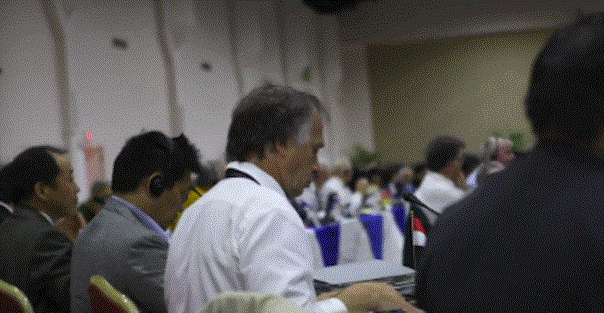Participating, as special Envoy of the Prince of Monaco, to the 64th Annual Meeting of the International Whaling Commission (IWC) that just ended in Panama, Dr Frédéric Briand - CIESM Director General - proposed a Resolution inviting the United Nations to place whale and dolphin conservation on the high sea 'under UN watch', so as to make sure at last that the countries still engaged in controversial whaling will finally respect the limits fixed by IWC (moratorium on commercial whaling, international whale sanctuaries, etc), thus restoring credibility and authority to that body.
Addressing a packed audience composed of his fellow Whaling Commissioners and Delegations from 66 participating Governments, plus representatives of 44 international NGOs, Frédéric Briand emphasized that years after the signature in 1946 of its founding Convention, the venerable Whaling Commission was today undermined by its inability to enforce its own decisions on some of its Members.

IWC action in Panama: Dr Frédéric Briand (right) making his points while the
Delegation
from Japan (with Dr Akima Umezawa, Ministry of Foreign Affairs, on far left) listens.
He referred specifically to ongoing Japanese industrial whaling in the Southern Ocean - declared in 1994 a no-kill IWC whale sanctuary - and to the temptations of other countries like South Korea to now follow suite under the false disguise of science. As he noted, "the IWC's allowance for scientific killing permits is a sad, obsolete legacy inherited from the initial 1946 ICRW Convention". "There is no doubt in my mind, he added, that scientists from Korea are familiar with the non-lethal techniques broadly available; there is a fast-growing scientific literature* on this".
As Frederic Briand made clear, this proposal touches both on UN and IWC unfinished business, picking first on the recommendations of Articles 65 and 120 of UNCLOS** which call the attention of the whole community of nations - and not only the members of the IWC 'hunting club' - to the conservation of marine mammals and to the mention, in the 1946 Whaling Convention (ICRW) Schedule, of only half (38) of the known migratory cetacean species; the other 38 species (many of them endangered) are therefore left 'in limbo', as he said.
The proposal met, as expected, fierce opposition from Japan, Norway and Iceland, which conduct whaling despite the 1986 global moratorium and who would prefer to see cetacean species treated in regional Fishery Conventions like 'fish good to be harvested". But it succeeded in obtaining the vocal support of a clear majority from all continents, as representatives from New Zealand, the EU countries, the USA, India, South Africa and the entire Latin American sub-continent all spoke in favour.
Building on the positive dynamics and large interest just generated, Dr Briand did not ask for a vote that could have been perceived as unnecessarily divisive but called instead for the creation of an international Task Force. This working group, composed of interested countries with broad experience of ongoing UN processes on the oceans, will engage a coordinated international effort exploring optimal UN- IWC synergies, with the aim to secure a legal framework for the lasting protection to the world cetaceans.
A dozen of key 'like-minded countries' - Argentina, Australia, Belgium, Brazil, Chile, Ecuador, France, New Zealand, South Africa, United Kingdom and the USA - have volunteered to join Monaco in this new Task Force. Frederic Briand, who will lead the group, is determined to engage its work without delay, so that "visible results are achieved before long", he said.
________________________________________
* for example
CIESM Monograph n° 25 [F. Briand, Editor] '
Investigating the roles of cetaceans in marine ecosystems', 144 pp., (2004).
** the United Nations Convention on the Law of the Sea, signed in 1982



